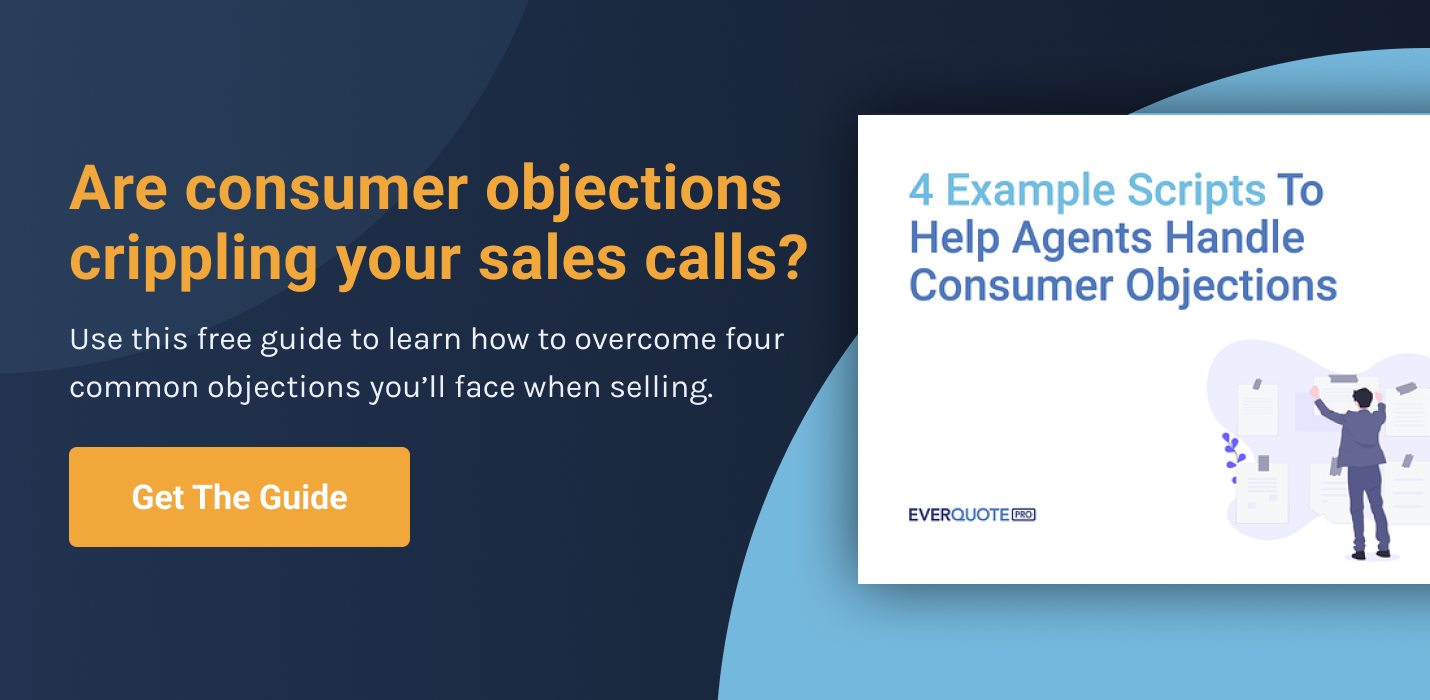- Home»
- EverQuote Pro Blog»
- “I never asked for a quote!” How to Turn Around Negative Sales Conversations & Insurance Lead Objections
“I never asked for a quote!” How to Turn Around Negative Sales Conversations & Insurance Lead Objections

What are the five words that can strike fear into the hearts of insurance agents—especially those who are new to the business or aren’t confident in their ability to sell?
“I never requested a quote!”
It’s a facepalm moment for most of us. So how can you turn this insurance lead objection into a positive (and productive) sales conversation? In this article, we’ll focus on attitudes and mindsets you must foster to become adept at easing the friction and moving past it toward a sale.
If you’re looking for specific scripts to follow, check out this free whitepaper: 4 Example Scripts To Help You Handle Consumer Objections
First, consider how you got the lead’s contact information.
Either the lead didn’t request the quote or they did, and you can figure out which one is the case by identifying where the lead came from. Here’s how you know the difference.
They didn’t request an insurance quote.
They were playing a game on Facebook, entered an online drawing, or something similar when they were prompted to enter their contact information in order to continue. Their contact information came to you as an insurance lead, but they have no intention of purchasing insurance. These types of leads may be cheap to purchase, but they offer minimal ROI because they often aren’t actually even looking at insurance products. We suggest avoiding these types of leads.
They did request an insurance quote.
If you’re getting your leads from a quality source like EverQuote, this is the only possibility. EverQuote only sells intentful leads, so when you get lead contact information from us, you can rest assured that the person on the other end of the line actually did previously complete a request for insurance information. Intentful leads have a much higher likelihood of converting to customers because they really are interested in what you’re offering.
For the purposes of this article, we’re going to focus on what you can do to turn around a conversation with consumers who do intend to purchase insurance, but for whatever reason, have changed their minds or are putting up defenses.
4 Ways To Handle Insurance Lead Objections
1. Don’t lead with an insurance pitch.
When a prospect answers the phone, your first job is to keep them on the line. To do that, avoid talking about insurance in the first few minutes of the call so you don’t put them in defensive mode.
- Catch them off guard by asking how things are going for them.
- Treat them like human beings—and be human yourself. No one wants to be “sold to,” but they may be receptive to learning things that can benefit them and their families.
- Learn as much as you can about the prospect before you dial (within reason). While dialing immediately is important, I suggest taking a minute to learn about the lead. Look at the car they have, what’s happening with insurance coverage where they live, their family, etc. Keep meticulous notes so you can follow up again if necessary.
2. Project good vibes only.
Want to stand alone in your prospects’ eyes? Then don’t sound like everybody else. Since you’re not face-to-face with a person, your personality and the energy you bring must shine through the phone. (Tweet this!) That means entering each call with a sense of belief that you can help, confidence that you are bringing value, and dedication that you will serve a customer even if they object at first.
You can go a long way towards doing this if you stop being defensive.
3. When a person objects, don’t argue with them.
“Let me guess, my competitor has called you 10 times. I am so sorry—I know that’s probably really annoying! Can I call you tomorrow morning instead? I know you’re trying to get a lower rate, and we want to make sure we can save you money. How does that work?”
In my experience, something like the above statement does wonders to pivot an objection.
- Lead by showing you’re in their corner. You’re not being pushy, and you’re putting yourself in their shoes.
- Provide options that work better for them.
- State the value you bring without being defensive.
Another tactic:
“Would it be OK if I shared what I have prepared? It will only take a couple of minutes, because I actually have your quote ready—I just need to confirm who’s in your household. I think we can save you money if we take a look.”
Again, there’s no defensive posture here. You’re not arguing, just presenting options and adding value.
4. Bring value.
In each conversation, bring value to your potential customer on the other end of the line. Have the mindset that you can help the person and you will do everything possible to bring that value to them. If you let yourself think they’re not going to buy from you, your negative thoughts will translate into the call.
Value can mean many things, including providing lower rates, sharing information about rate decreases and changes in insurance requirements in their area, and more. Don’t only limit yourself to price (although that’s always an important factor to share).
Resources
- Learn about each of the different types of insurance lead objections in our article: Overcoming Objections In Insurance Sales: What To Do (& Why)
- Check out our free whitepaper about optimizing your contact strategy to boost lead revenue by up to 128%: Binding Inbound Leads: Using Contact Strategy To Bind More Business
- Make sure your pipeline is filled with high-quality leads. EverQuote is the place to go—contact us now to start receiving leads in your inbox today.
Unlock predictable growth with EverQuote.
Our representatives are standing by to help you succeed.
Call 844-707-8800
Weekdays, 9AM-5PM (ET)
Call 844-707-8800
Weekdays, 9AM-5PM (ET)
Accelerate your growth.
Complete the form below or just call 844-707-8800 to learn how we can help you achieve your goals.
By clicking "Get Started", I consent by electronic signature to being contacted by EverQuote, including by automatic telephone dialing and/or an artificial or prerecorded voice (including SMS and MMS - charges may apply), regarding EverQuote for Agents, even if my phone number is listed on a Do Not Call Registry. I also understand that my agreement to be contacted is not a condition of purchasing any goods or services, and that I may call (844) 707-8800 to speak with someone about EverQuote for Agents.
By clicking "Get Started", I affirm that I have read and agree to this website’s Privacy Policy and Terms of Use, including the arbitration provision and the E-SIGN Consent.
* Mandatory fields
 Product Overview
Product Overview Blog
Blog FAQs
FAQs Webinars
Webinars eBooks & Resources
eBooks & Resources